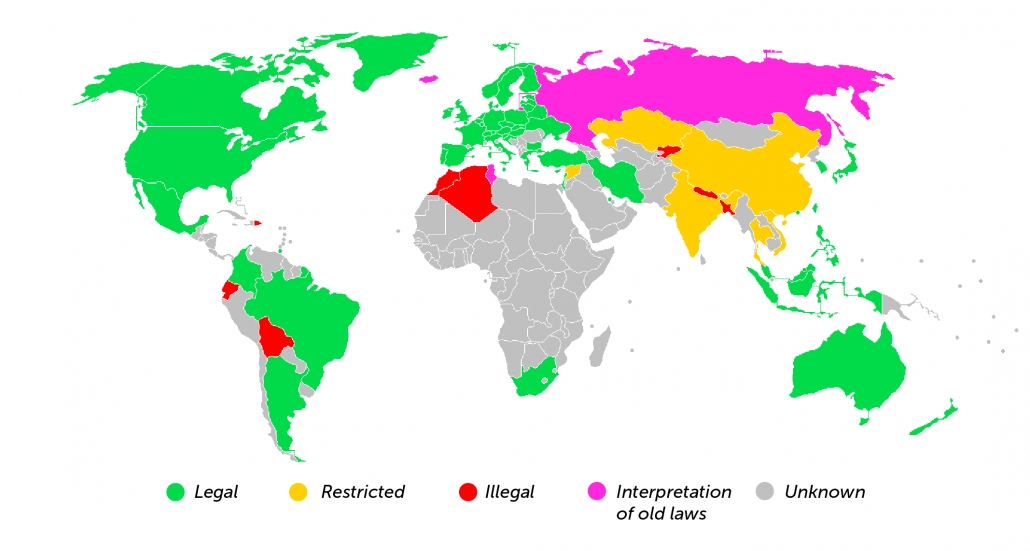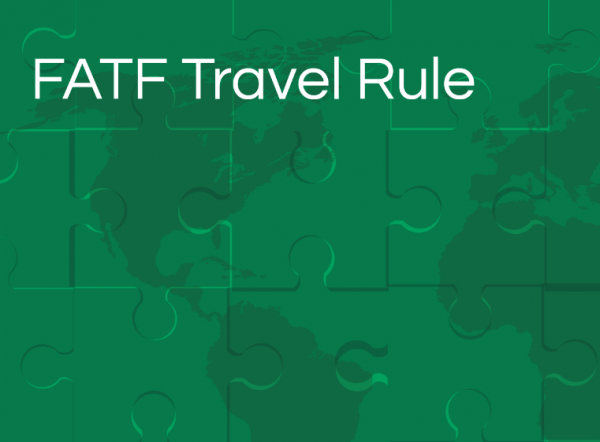Contents
- How does the R.16 “Travel Rule” impact VASPs?
- What are the FATF’s Travel Rule expectations of countries and VASPs?
- Why should VASPs comply with the Travel Rule?
- What will happen if VASPs don’t adhere to the Travel Rule?
- What are the benefits for VASPs to comply with the Travel Rule?
- Conclusion
The Financial Action Task Force (FATF)’s recently updated Recommendation 16 in June 2019 is frequently monikered by the media as the “Crypto Travel Rule”, in reference to the U.S.’ Bank Secrecy Act (BSA)’s established traditional banking regulation. Its information-sharing requirements present a difficult hurdle for VASPs to cross, where non-compliance could have severe regulatory repercussions.
For virtual asset service providers (VASPs), complying with the new R.16 regulation as adapted in the FATF’s Risk-Based Approach to Virtual Assets and Virtual Asset Service Providers guidance is a double-edged sword. Compliance alienates its more libertarian user base likely to see it as a capitulation to government interference and a sign to move their virtual assets elsewhere more private. On the other hand, compliance opens the gates to traditional financial markets as well as the legal certainty needed to look at assets like Bitcoin as a secure long-term investment. In this article, we look at why it’s in VASPs’ best interest to comply with Recommendations 16.
How does the R.16 “Travel Rule” impact VASPs?
The FATF’s well-known 40 Recommendations are non-binding guidances that help the G20 watchdog to create a uniform and cohesive global Anti-Money-Laundering (AML) and Combating-Funding-Terrorism (CFT) policy. The FATF doesn’t target or prosecute individual transgressors but focuses instead on creating and then disseminating its policies worldwide to its 39 member jurisdictions and extended network of 9 FATF-Style Regional Bodies (FSRBs).
The Task Force cleverly puts the onus on its 200+ member countries to ensure that their local VASPs are compliant with its latest recommendations, also known as the FATF Standards. If not, they reserve the option to punish the countries in which a VASP is incorporated, by adding them to a high-risk monitoring list (greylist) or non-compliance list (blacklist).
What are the FATF’s expectations of countries and VASPs?
According to the FATF, countries need to:
- Understand the money laundering and terrorist financing risks the sector faces
- License or register virtual asset service providers
- Supervise the sector the same it does with other financial institutions
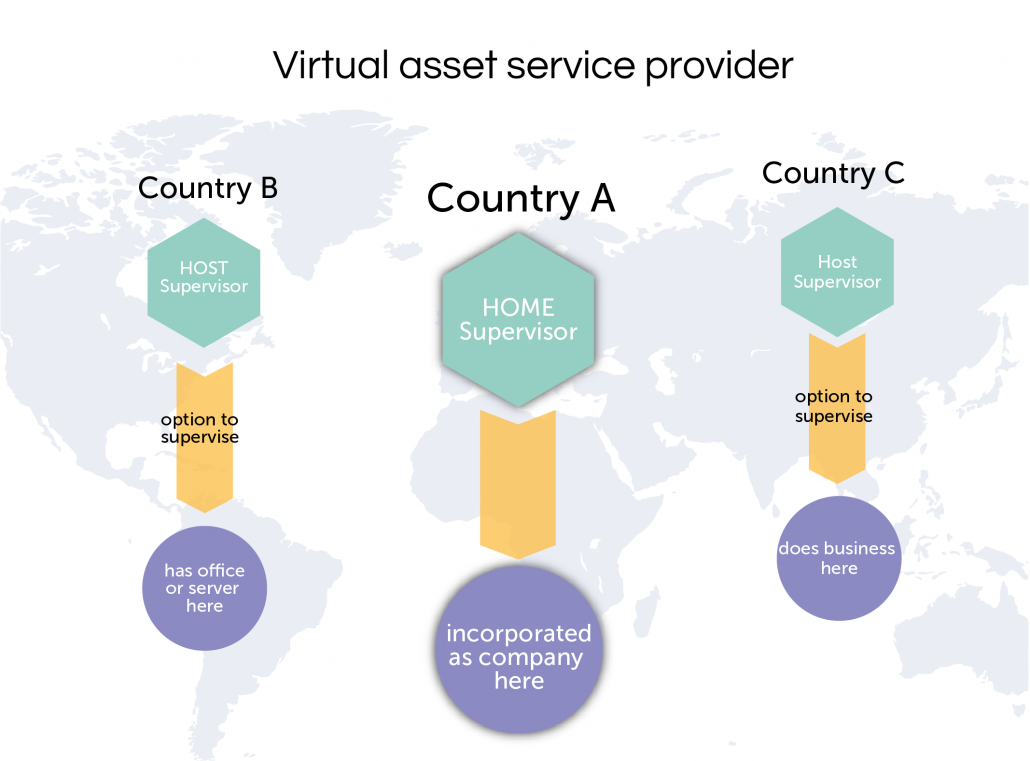
Virtual asset service providers need to:
- Implement the same preventive measures as financial institutions, including customer due diligence, record keeping and reporting of suspicious transactions
- Obtain, hold and security transmit originator and beneficiary information when making transfers
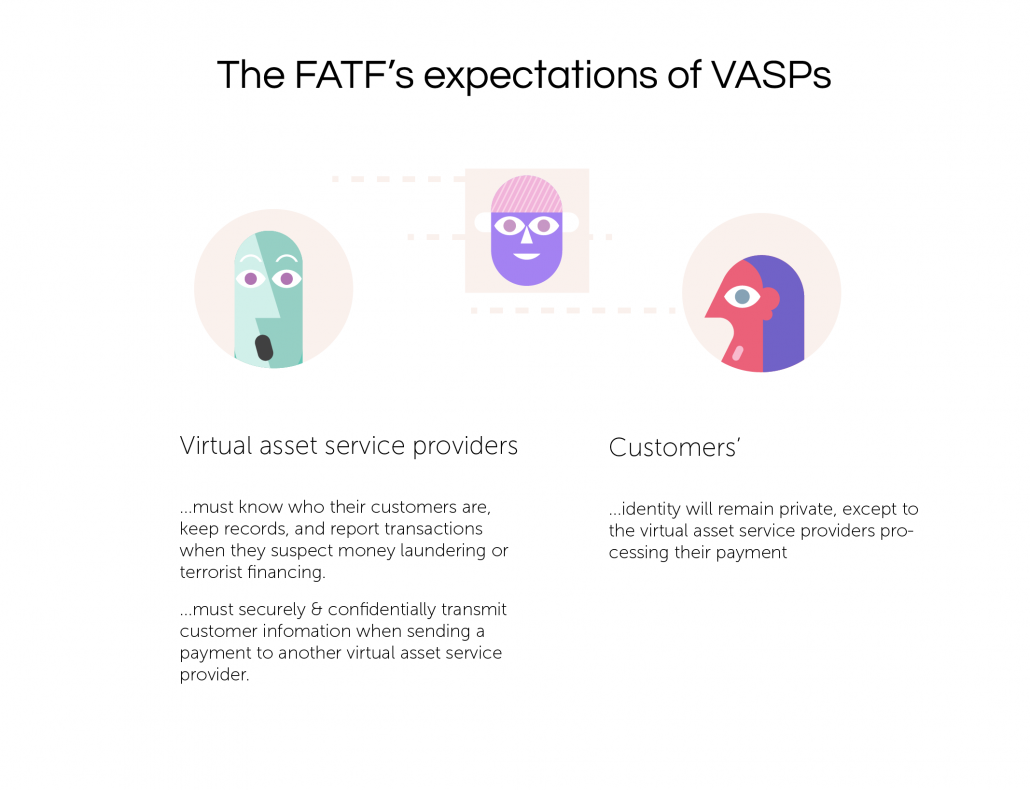
What will happen if VASPs don’t comply with the Travel Rule?
While VASPs won’t get an automatic red card from the FATF directly, they can expect a swift and strong response from domestic, regional and global regulators.
The FATF will not deviate from its mission to ensure AML/CFT compliance in the crypto industry. The graphic below, provided by the FATF, illustrates why. Without real-name checks, it is a simple rinse-and-repeat process for bad actors to steal cryptocurrencies or receive it as part of criminal activities, then send it to VASPs to get “cleaned”, after which it is converted into fiat currency.
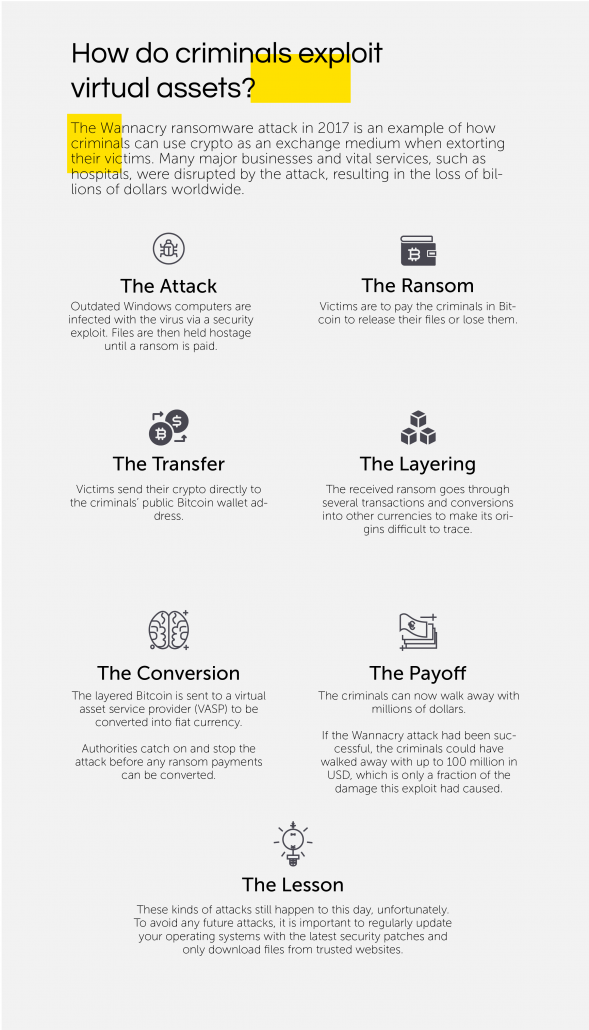
While it’s now clear how the FATF sees the future of cryptocurrencies, the same cannot be said for individual countries, who are all struggling to untangle the benefits of blockchain technology from the vices of cryptocurrency misbehavior. Running the risk of a FATF demotion for protecting the rights of ( or turning a blind eye to) unregulated financial institutions operating in an industry barely worth $200 billion at the time of writing, simply won’t add up for most countries.
Countries will therefore make it a priority to ensure that VASPs in their jurisdictions are either fully compliant with the FATF’s AML/CFT regulations by the FATF’s June 2020 deadline or don’t exist at all in their jurisdictions. China, the current FATF president, is leading from the front in this regard, with its recent crackdown on cryptocurrencies set to continue unabated for the foreseeable future.
In March 2019 there were less than 20 countries in the world where Bitcoin ownership was either illegal or restricted. There is a real risk that this number of countries will shoot up if a suitable Travel Rule solution isn’t found in 2020.
Where countries have any doubt about their exposure to money laundering and terrorism funding due to cryptocurrencies, the easiest avenue for them could very well be to ban cryptocurrencies altogether or penalize them into bankruptcy.
Why should VASPs comply with the Travel Rule?
For a virtual asset service provider, complying with “invasive” regulations is a double-edged sword. While on the one hand compliance opens the gates to a potentially much bigger audience as well as long-term legal certainty, it also alienates its more hardcore libertarian-minded cryptocurrency user base, who will see exchanges’ compliance drives as a capitulation to government interference and a clear sign to move their virtual assets underground to a more private location.
Despite this, it’s not a tough choice to make, in fact, it’s hardly a choice at all. Regulations will force exchanges to comply or face extinction.
What benefits are there for VASPs to comply with the Travel Rule?
Taking a glass-half-full, longer view of regulations like Recommendation 16, there seem to be plenty of reasons why VASPs should willingly comply with the Travel Rule, not only because of an existential threat to their business operations.
Being in the FATF’s good graces opens up new markets worldwide
Since 2018, regulatory and governmental giants such as the FATF (global), CFTC, SEC and FinCEN have started to make it clear that the unregulated era of virtual assets is coming to an end. New definitions on money service businesses (MSBs), and convertible virtual currencies (CVC), virtual assets (VA) and VASPs has led to the increasing prosecution of individuals. A recent combined statement by the SEC, FinCEN and CFTC showed a united front against crypto money laundering and terrorism financing.
It stands to reason that being on the good side of the FATF and FinCEN, the world’s two biggest AML/CFT organizations (mandated respectively by the G20 and the U.S.) will have the knock-on effect that VASPs meet the regulatory standards elsewhere in the world, at least the most stringent ones. This could greatly reduce the red tape for VASPs when undergoing due diligence and opening bank accounts in certain countries still resistant to crypto exchanges.
While new challenges such as the European Union’s Fifth Money Laundering Directive (5MLD), which becomes official in January 2020, demonstrate the gradual and iterative evolution that crypto regulation will undergo in the coming decade, complying with the FATF’s most pressing regulations is a great way to start.
Access to regular financial services such as bank accounts
There’s significant distrust between VASPs and traditional financial institutions, who view them as risky business partners that operate in murky legal waters. To protect themselves, FI’s often deny exchanges critical financial services, as can be seen in the recent withdrawal of services from Korea to South Africa, both previously friendly to law-abiding exchanges. Potentially up to 97% of Korean exchanges are in danger of closing due to a lack of cooperation from domestic banks.
The FATF believes that by implementing its regulations, VASPs will be able to foster more trust in blockchain technology as a “robust and viable means to transfer value” and can eventually expect to be afforded the same status and privileges that are afforded to regular financial institutions.
Better reputation, more investment
Having all their regulatory ducks in a row will greatly polish a VASP’s reputation as a safe investment destination for both institutions and individual investors. No longer concerned with unknowingly rubbing shoulders and intermingling their funds with that of money launderers and terrorists, financial institutions will be able to invest in VASPs with confidence.
Over the last 18 months, a dozen Bitcoin exchange-traded fund (ETF) proposals have been submitted with the hopes of getting the blessing of the U.S. Securities and Exchange Commission (SEC). Each application has been delayed or rejected, often resulting in major Bitcoin price movement.
In October 2019, within its 112-page long disapproval of the Bitwise ETF proposal, the SEC finally provided the reasoning behind their decisions.
“Because, among other things, the Sponsor has asserted that 95% of the bitcoin spot market consists of fake and non-economic activity, but has not established that it has, in fact, identified the “real” bitcoin market, or that the “real” bitcoin market is isolated from the fraudulent and manipulative activity, we find, in each case, that NYSE Arca has not met its burden to demonstrate that its proposal is consistent with the requirements of Exchange Act Section 6(b)(5), and therefore the Commission disapproves this proposed rule change.”
SEC October 2019- Bitwise/NYSE ARCA ruling
In short, the SEC’s biggest crypto gripe is the rife market manipulation, confirmed by Bitwise’s research that indicated 95% of current crypto trading volumes are fake. Coupled with the liquidity problems that most virtual assets and exchanges are dealing with, the SEC felt strongly that the Bitcoin market was not mature enough yet for an officially approved ETF.
Greenlight to create crypto-based financial instruments
Analysts interpreted this latest SEC rejection as an implicit statement that a Bitcoin ETF could still be years away. There were however a few positive takeaways from the SEC’s statement. The SEC’s lengthy response meant that they had a serious deliberation on a Bitcoin ETF and confirmed they’re leaving a back door open, with their statement that a “surveillance-sharing agreement between a regulated VASP and a bigger Bitcoin market (of “significant size”) would ease its market manipulation concerns.
An SEC-approved Bitcoin ETF opens BTC to a much broader traditional investor base, and could lead to a massive influx of “new money” investments and institutional funding into the cryptosphere. It will also help regulated financial institutions develop and successfully market more sophisticated and crypto derivatives such as options, swaps, and futures.
Better security for exchanges
By complying with the Travel Rule, participating VASPs will benefit from improved security for exchange transactions and fund custody. Any Travel Rule solution will likely create a type of global database of VASPs in order to help exchanges know who they’re dealing with during transmittals and whether their counterpart meets the FATF Standards.
Also, bad actors will be less likely to transact on R.16-compliant exchanges, for fear of leaving a transaction trail that law enforcement might find. The same goes for hackers. Knowing that an exchange is able to share personally identifiable information with other exchanges and might freeze or block transactions, make exchanges riskier to target.
Being able to identify and connect with other trust-worthy VASPs will greatly help to fortify exchanges’ resilience against hacks and scams and make it easier for them to reclaim stolen assets. This is especially important when convincing authorities like the SEC to view crypto as favorable.
Conclusion
The FATF has indicated this year that due to the fast-moving nature of virtual asset technology, it will continue to evaluate the industry and take its next AML/CFT-promoting steps in June 2020. This can be interpreted as a sign that the Travel Rule is only the first of more to come.
By its own admission, the FATF isn’t trying to regulate innovative technology such as virtual assets. In fact, the organization is technology agnostic and has previously declared that it sees great potential in the ability of virtual assets to benefit the global population. Therefore, it’s important for VASPs to create a constructive and objective discussion with regulators to make things easier not only in 2020, but in the decade to follow.
